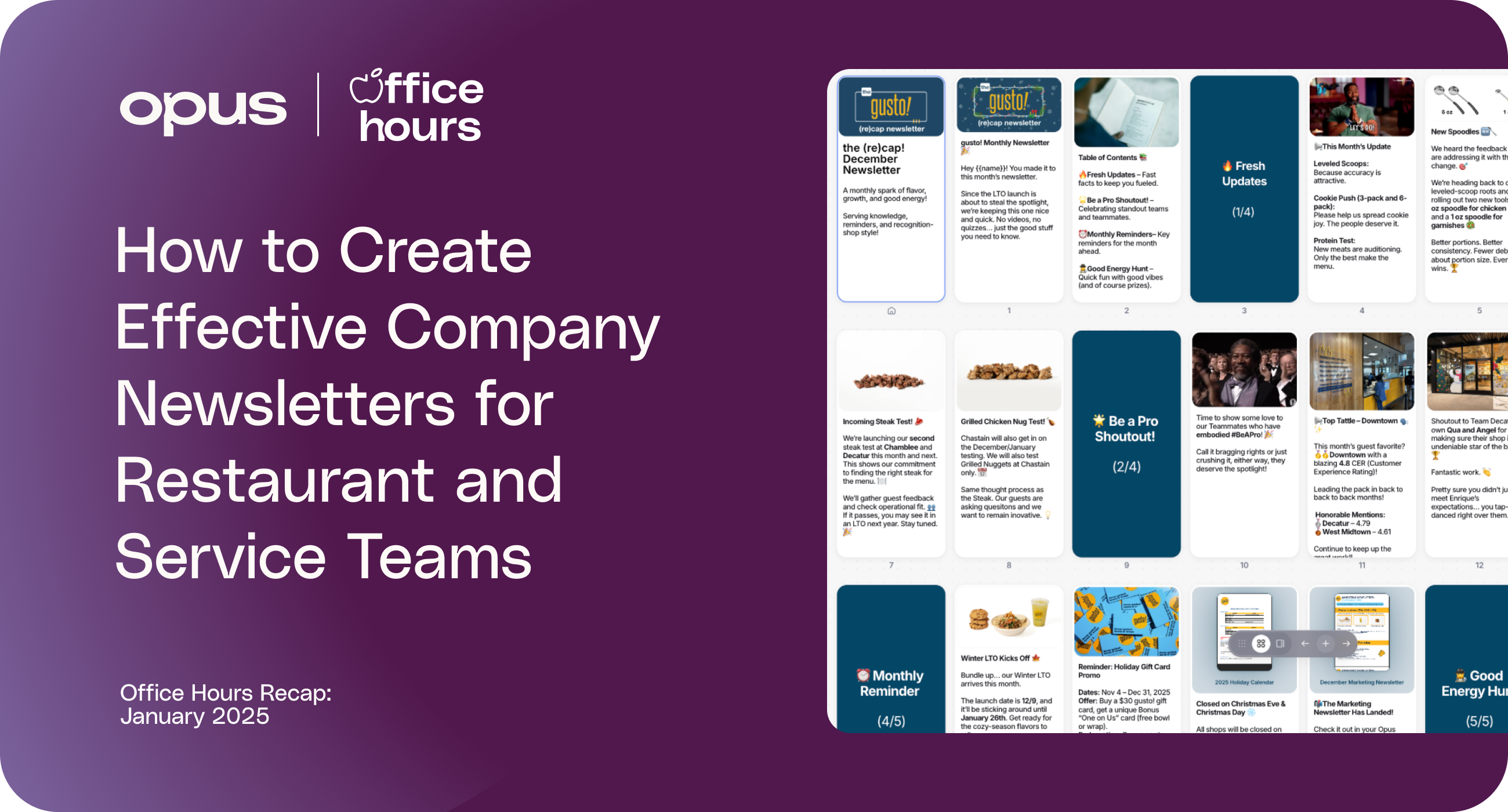What's more important, EQ or IQ? The development of soft skills in frontline employees and employee engagement are inextricably connected. Gallup’s “State of the American Workplace” report found that companies with highly engaged employees see almost a 70% lower turnover rate than companies with employees who are no engaged.
To make it to the highest levels in the restaurant, retail, and manufacturing industries, frontline workers have to have a special set of abilities. These include the ability to communicate effectively, juggle multiple tasks, coordinate well with others, make decisions, solve problems, offer customer service, resolve conflicts, manage their time, and pay attention to detail. When these skills are combined, frontline workers can gain the confidence, expertise and abilities that are needed to reach the highest levels. With the correct focus, these workers can take their abilities to the next level and attain the best positions. Here are the top 10 on-demand soft skills needed in frontline workers we see at Opus and 5 tips to help employers cultivate those soft skills.

1. Communication Skills Are Just the Tip of the Iceberg
A 2018 CareerBuilder report says that 77% of employers believe soft skills are important; 20% report that soft skills are even more important than hard skills. Having good communication skills can help frontline workers build relationships with customers and coworkers, as well as resolve any issues that may arise. One of the most important skills needed for frontline workers is the ability to communicate effectively. This includes being able to communicate with customers, colleagues, and supervisors thoughtfully and clearly. Frontline workers need to be given space to be able to express their ideas and opinions in a concise and persuasive way. They also need to be able to listen to others and understand their needs.
Frontline teams need to be able to speak confidently and clearly, as well as use proper body language and facial expressions. They also need to be able to handle customer complaints and inquiries in a polite and professional manner. Additionally, frontline workers need to be able to work well with people from a variety of backgrounds and cultures.
2. Focus Skills Are Better Than Multitasking Skills
Focusing on one task at a time can be a more efficient use of time than multitasking. Although switch costs may be relatively small, they can add up when people switch repeatedly between tasks. A study by Rogers and Monsell (2004), "The Cost of a Voluntary Task Switch", found that people were still slower when switching between tasks than when repeating tasks, even when given more time. This means that multitasking may not be as efficient as it seems, and can lead to potential errors, especially for frontline workers.
Frontline employees need to be able to work well under pressure and stay organized. Being able to switch quickly between tasks and keeping track of multiple deadlines leads to a loss in productivity. Meanwhile, a high level of focus and attention to detail to one task done well can yield to even more soft skills development in areas such as prioritization in which frontline teams can better and more independently determine which tasks are most important.
3. Organizational Skills Keep Track of Tasks
Frontline workers need to be able to stay organized and keep track of their tasks. This includes being able to create lists, prioritize tasks, and stay on top of deadlines. Organization also requires being able to manage time effectively and stay focused on the task at hand. Frontline workers need to be able to plan ahead and anticipate any potential issues that may arise.
Organization also requires being able to keep track of inventory, store items in an orderly fashion, and set up displays. Additionally, frontline workers need to be able to manage paperwork and complete paperwork in a timely manner. Organization is essential for frontline workers to be able to work efficiently and effectively.
4. Teamwork Skills Lead to Conflict Resolution
Teamwork is essential for frontline workers, as they often need to work in teams in order to complete tasks. Frontline workers need to be able to work well with others and build strong relationships with their colleagues. They need to be able to communicate and collaborate effectively, as well as provide support and encouragement to their teammates.
Teamwork also requires being able to take initiative and take on leadership roles when necessary. Frontline workers need to be able to delegate tasks and provide feedback to their teammates. Additionally, frontline workers need to be able to resolve conflicts quickly and efficiently.
5. Decision-Making Skills Mean Independent Thinking
Frontline workers need to be able to make decisions quickly and confidently. This includes being able to evaluate situations and make decisions based on the best available information. Frontline workers need to be able to weigh options and make decisions that are in the best interest of the company. They also need to be able to anticipate any potential problems and take appropriate action.
Decision-making also requires being able to think critically and make decisions that are in line with the company’s values and goals. Additionally, frontline workers need to be able to make decisions that are in the best interest of the customer. Decision-making is an essential skill for frontline workers to be able to handle any situation that may arise.
6. Problem-Solving Skills Supercede Digital Natives
Frontline workers need to be able to identify and solve problems quickly and efficiently. This includes being able to analyze situations, identify the root cause of the problem, and come up with solutions. Problem-solving requires being able to think critically and creatively, as well as being able to come up with innovative solutions.
It’s important to acknowledge here that problem-solving skills and leveraging technology to solve problems are not always linked. A report showed that being a digital native had little bearing on an American’s competency to use digital technology to evaluate information and perform practical tasks. People ages 16 to 34, even with degrees of some form, can’t compete with international peers with similar education levels when it comes to soft skills and problem-solving.
Problem-solving also requires being able to troubleshoot and identify potential issues before they arise. Additionally, frontline workers need to be able to come up with solutions that are in the best interest of the company and the customer. Problem-solving is an essential skill for frontline workers to be able to handle any situation that may arise.

7. Attention to Detail Skills Reduce Errors
It seems obvious, right? This one continues to top the charts regardless and should be identifies as a keep skill to develop in frontline teams. Attention to detail is a skill that one can layer on top of problem-solving and focus. Frontline workers need to be able to pay attention to detail in order to ensure accuracy and quality. This includes being able to pay attention to small details, as well as being able to identify any potential issues before they arise. Attention to detail requires being able to stay organized and focused, as well as being able to look for patterns and identify trends.
Attention to detail also requires being able to keep track of inventory, as well as being able to spot errors and inconsistencies. Additionally, frontline workers need to be able to review documents and check for accuracy. Attention to detail is an essential skill for frontline workers to be able to work efficiently and effectively.
8. Customer Service Skills Make the Biggest Business Impact
Returning customers are the surest way to maintain revenue streams and help employees focus on upselling. Customer service is an essential skill for frontline workers. This includes being able to identify customer needs, provide solutions, and meet customer expectations. Frontline workers need to be able to provide excellent customer service, as well as handle customer complaints and inquiries in a polite and professional manner.
Customer service also requires being able to build relationships with customers, as well as being able to upsell and cross-sell products and services. Additionally, frontline workers need to be able to handle customer disputes and ensure customer satisfaction. Customer service is an essential skill for frontline workers to be able to keep customers coming back and ensure repeat business.

9. Conflict Resolution Skills. Period.
A report from CPP Global suggests that employee expectations in regards to conflict resolution aren't being met. They're not satisfied with how their bosses are handling disputes, and there's a big difference between how well managers think they handle conflict and how well they actually do, according to the employees. In most cases, it's the frontline employees who are in the best position to deal with conflict in its early stages before it escalates.
So what are the skills associated with effective conflict resolution? Conflict resolution includes being able to identify the root cause of the conflict and come up with solutions that are in the best interest of all parties involved. Frontline workers need to be able to remain calm and professional in difficult situations, as well as being able to negotiate and compromise.
Conflict resolution also requires being able to listen to all parties involved and provide a safe and supportive environment for everyone to express their views. Additionally, frontline workers need to be able to remain impartial and make decisions that are fair and equitable. Conflict resolution is an essential skill for frontline workers to be able to handle any situation that may arise.
10. Time Management Skills Lead to Better Delegators
Frontline workers need to be able to manage their time effectively in order to complete tasks on time. This includes being able to prioritize tasks, create lists, and manage multiple tasks at the same time. Time management requires being able to stay organized and focused, as well as being able to manage deadlines and anticipate any potential issues.
Time management also requires being able to plan ahead, as well as being able to adjust plans quickly if needed. Additionally, frontline workers need to be able to delegate tasks and manage their workloads efficiently. Time management is an essential skill for frontline workers to be able to work efficiently and effectively.
Tips for Cultivating Essential Skills for Frontline Workers
Employers should not assume that their perception of skills and advancement opportunities are shared by their frontline teams. McKinsey research shows that the perspective of frontline employees about resources is often more accurate than the employers’ perceptions. However, some resources (such as on the job training) are still underused relative to employee awareness. In these cases, employers can focus on aligning their offerings to the needs of their teams while considering the challenges within context of their industry.
With the development of organizational awareness in mind, frontline workers need to be able to cultivate the essential skills needed for success. Here are some tips for cultivating these essential skills:
- Develop skills-first job descriptions - Attracting talent by seeking EQ rather than IQ can lead to diverse thinking and better business outcomes
- Provide on-ramps - Soft skills in frontline workers can be brought to the surface and can be trained. Through work training programs, businesses can actively develop soft skills in their frontline teams in order to increase engagement and productivity.
- Practice – Give frontline workers the space to practice their essential skills through scenarios and reverse role play. And, ensure frontline workers are given permission to seek ongoing feedback from their supervisors in order to stay on track.
- Set goals – Frontline workers need to set goals in order to stay motivated and focused. Setting goals as a company also exemplifies yet another soft skills that your team can emulate.
- Train consistently – Frontline workers need to take classes and attend workshops in order to stay up to date on the latest trends and best practices.
By cultivating these essential skills, frontline workers can gain the confidence, knowledge, and skills necessary to reach the top. With the right focus, frontline workers can take their skills to the next level and rise to the top.
Hi, we're Opus 👋🏽
Next-generation training technology that helps businesses with a deskless workforce get their teams up the productivity curve quickly.







